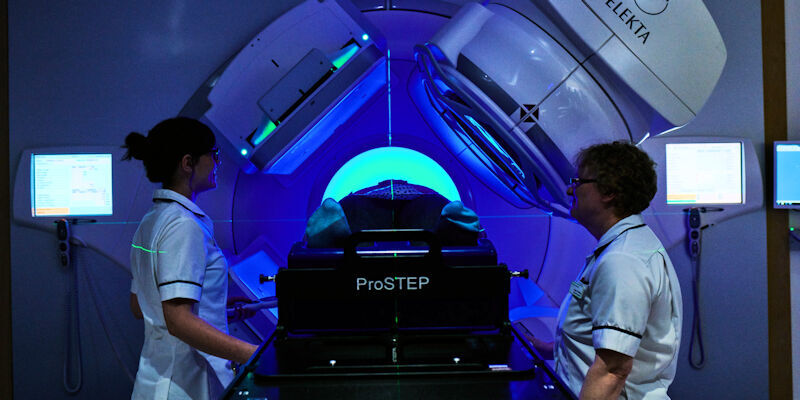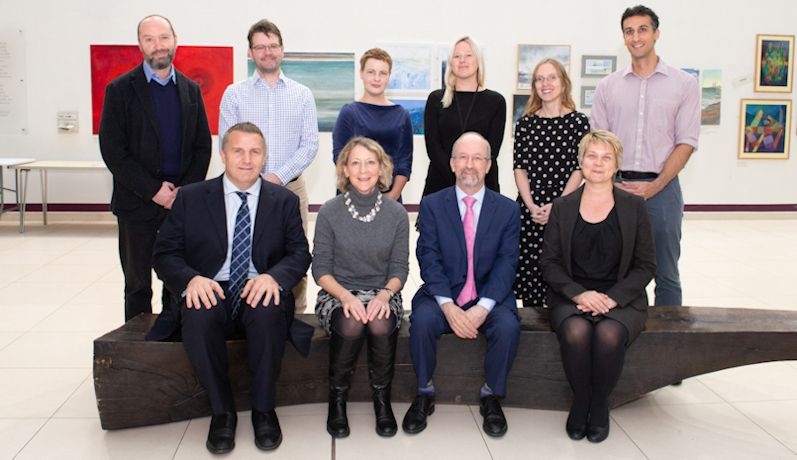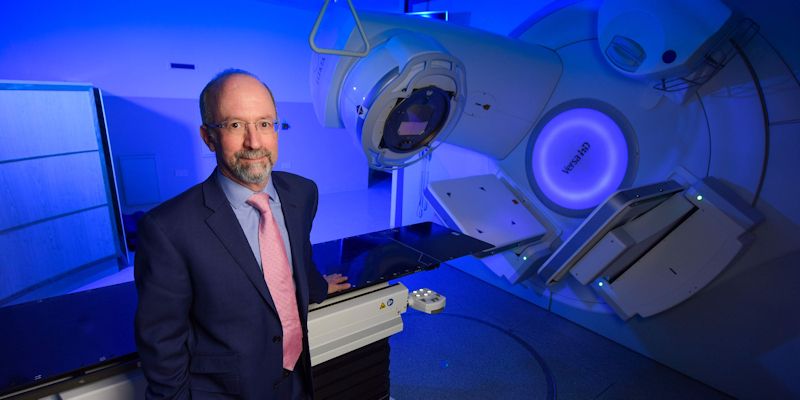
Leeds scientists and clinicians have been awarded a major cash boost from Cancer Research UK to pioneer new radiotherapy technologies that could help more people in Yorkshire survive cancer.
Led by Professor David Sebag-Montefiore, experts from the University of Leeds and Leeds Teaching Hospitals NHS Trust are set to receive £3.5 million over the next five years to fund advances in radiotherapy research, including the use of artificial intelligence with imaging technology.
Leeds has been chosen to be one of just seven Centres of Excellence in a UK-wide network, RadNet, that will accelerate advances in radiotherapy research. Other centres will be located in Manchester, Cambridge, Oxford, Glasgow and London.
“Achieving the status of a Cancer Research UK Centre of Excellence is important recognition of our overall commitment to excellence in cancer care and the science which underpins it”
Sir Alan Langlands, Vice-Chancellor of the University of Leeds, said: “Achieving the status of a Cancer Research UK Centre of Excellence is important recognition of our overall commitment to excellence in cancer care and the science which underpins it, in particular the outstanding quality and impact of radiotherapy research in Leeds.
"Improving cancer outcomes is at the heart of our research strategy and radiotherapy plays a crucially important role in increasing survival rates for a broad range of cancers.”
Precise, personalised treatment
Radiotherapy is a precise treatment that is given to patients as an out-patient on a daily basis. In its simplest form, it uses high energy X-ray radiation beams to selectively kill cancer cells by irreversibly damaging their DNA, while minimising the effect on the surrounding normal tissues.
Research at the Leeds Centre of Excellence will combine the use of artificial intelligence, magnetic resonance imaging and new drugs with radiotherapy, focussing on patients with anal, rectal, prostate, liver and brain cancers.
Professor Sebag-Montefiore, from the School of Medicine, said: “We are very proud that Leeds has been awarded this grant to bring the next generation of radiotherapy treatments to patients sooner, helping to save the lives of more people with cancer in Yorkshire.
“Using artificial intelligence analysis of the MRI scans will help us to tailor future treatment for patients and reduce side effects, resulting in new, precise and personalised treatments – and a better quality of life afterwards – in the next five to ten years.
“Working with other colleagues in imaging, computing and AI disciplines, and combining research excellence across different areas of science, will allow us to deliver this in the quickest timeframe.
“This funding from Cancer Research UK will help us accelerate our development of new and advanced radiotherapy techniques, leading to the best treatment approaches for patients across a broad range of cancers, challenging the boundaries of this mainstay treatment through world-first exploratory projects and taking our research in Leeds to an internationally-leading level.
“It will also fund 13 new researcher posts and strengthen Leeds’s position as an excellent destination to train the next generation of researchers."
The Leeds centre brings together an interdisciplinary team of researchers across faculties and multiple disciplines, including the University's School of Medicine, Leeds Institute of Medical Research, Leeds Institute of Clinical Trials and the School of Computing. They will work with clinicians, image and data analytics experts and the radiotherapy research group at Leeds Teaching Hospitals NHS Trust.

The RadNet research team from the University of Leeds and Leeds Teaching Hospitals Trust
This funding substantially grows the core Cancer Research UK infrastructure investment in Leeds, following an award earlier this year of core funding for the Leeds Clinical Trials Unit.
Today, the Leeds Cancer Centre, based at St James’s University Hospital, is one of the largest radiotherapy centres in the UK. It treats more than 7,400 new cancer patients from across the region every year. Radiotherapy is used for more than 40% of patients cured of their cancer.
Yvette Oade, Deputy Chief Executive of Leeds Teaching Hospitals NHS Trust, said: “Leeds Cancer Centre treats over 7,400 new cancer patients each year with radiotherapy, and at Leeds Teaching Hospitals we are fully committed to providing the best integrated care and helping to accelerate the development of new and better treatments.
“We promote and support excellence in clinical work along with the research that creates new and exciting treatments and creating a new Centre of Excellence will help more of our patients survive cancer in the future. We are proud to work in partnership with the University of Leeds and charities like Cancer Research UK and Leeds Cares to make all of this possible.”
The support of the hospital’s Leeds Cares charity played a key role in the successful bid for the Centre of Excellence funding. It raised £2.4 million to purchase a dedicated MRI Simulator, a critical piece of equipment to allow patients to have MRI scans performed in the radiotherapy department. This will be the first MRI Simulator to be installed in Yorkshire.
Andrew Cratchley, Interim Managing Director of Leeds Cares, said: “As the official charity partner of Leeds Teaching Hospitals, Leeds Cares supports NHS staff to deliver the best care for patients and their families. We are incredibly proud that donations to Leeds Cares enable us to support many services across the hospital, including the Radiotherapy Department at Leeds Cancer Centre.
“Thanks to the inspiring generosity of our donors, we have been able to fund projects like the MRI Simulator. With ongoing support, we can continue to make a huge difference to radiotherapy patients across Yorkshire and beyond.”
Commitment to cancer care
In total, Cancer Research UK is investing £56 million in Cancer Research UK RadNet – the charity’s largest ever investment in radiotherapy research.
Cancer Research UK supported some of the earliest research into the treatment of cancer with radiation, and pioneered the first use of radiotherapy in the 1920s.
Michelle Mitchell, Chief Executive of Cancer Research UK, said: “Radiotherapy is a cornerstone of cancer medicine, with around 3 in 10 patients receiving it as part of their treatment.
"The launch of our network marks a new era of radiotherapy research in the UK. Scientists will combine advances in our understanding of cancer biology with cutting-edge technology to make this treatment more precise and effective than ever before."

Professor David Sebag-Montefiore from the University of Leeds and Leeds Teaching Hospitals NHS Trust
Nicki Embleton, Cancer Research UK spokesperson for Yorkshire, said: “This award is fantastic recognition of the world leading radiotherapy research taking place here in Leeds, which will help shape a better future for people with cancer in Yorkshire through new technologies and treatments.
“People in the city have every right to feel proud of the ground-breaking research being carried out on their doorstep, and of their fundraising efforts, which are helping to beat the disease.”
She continued: “Every hour, around three people are diagnosed with cancer in Yorkshire and the Humber. That’s why we’re working every day to find new ways to prevent, diagnose and treat the disease.”
Further information
For interview requests please contact Simon Moore, Press Officer at the University of Leeds, on 0113 34 38059 or email Simon Moore at s.i.moore@leeds.ac.uk.
RadNet will unite seven centres of excellence across the country: the Universities of Leeds, Cambridge, Glasgow, Manchester and Oxford, the Cancer Research UK City of London Centre (a partnership between Queen Mary University of London, University College London, Kings College London and the Francis Crick Institute) and the Institute of Cancer Research in partnership with the Royal Marsden Hospital, London.